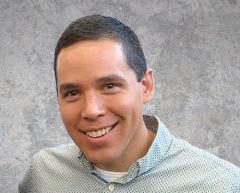 Natan Obed: is the President of Inuit Tapiriit Kanatami. He is originally from Nain, the northernmost community in Labrador’s Nunatsiavut region, and now lives in Ottawa. For 10 years he lived in Iqaluit, Nunavut, and worked as the Director of Social and Cultural Development for Nunavut Tunngavik Inc. He has devoted his career to working with Inuit representational organizations to improve the wellbeing of Inuit in Canada.
Natan Obed: is the President of Inuit Tapiriit Kanatami. He is originally from Nain, the northernmost community in Labrador’s Nunatsiavut region, and now lives in Ottawa. For 10 years he lived in Iqaluit, Nunavut, and worked as the Director of Social and Cultural Development for Nunavut Tunngavik Inc. He has devoted his career to working with Inuit representational organizations to improve the wellbeing of Inuit in Canada.
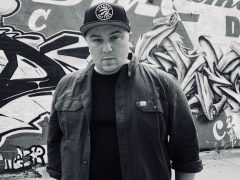 Ryan McMahon: is an Anishinaabe comedian, writer, media maker and community activator from Couchiching First Nation in Treaty 3 Territory. Recognized as Indian Country’s most decorated stand up comedian, Ryan has recorded 5 national comedy specials since 2010, appeared at the prestigious Just For Laughs festival a number of times, and later this year, is showcasing for HBO as his irreverent, forward looking and challenging brand of comedy spreads around the world.
Ryan McMahon: is an Anishinaabe comedian, writer, media maker and community activator from Couchiching First Nation in Treaty 3 Territory. Recognized as Indian Country’s most decorated stand up comedian, Ryan has recorded 5 national comedy specials since 2010, appeared at the prestigious Just For Laughs festival a number of times, and later this year, is showcasing for HBO as his irreverent, forward looking and challenging brand of comedy spreads around the world.
Ryan has written for The Globe and Mail, VICE, New York Times, and the CBC. Currently, Ryan has just completed his first book, The Great NDN Paradox (Arsenal Pulp Press/Robin’s Egg Books), and is currently shopping his second book, “2167 – Future Reason For A Country,” a seriously funny investigation into the next 150 years in Canada.
It’s McMahon’s media work that has cemented his place in the current political/social discourse on reconciliation in Canada and the collision between Indian Country and the mainstream. He’s the CEO of the Makoons Media Group and is currently building the worlds only independent Indigenous media platform committed to digital publishing and the internet.
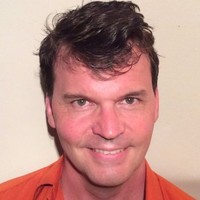 Aaron Franks: recently joined the First Nations Information Governance Centre as Senior Manager for Information Governance and OCAP®. He holds a PhD in Human Geography from the University of Glasgow and has worked as a researcher with the Centre for Environmental Health Equity (CEHE) at the University of Manitoba and Queen’s University, and the Centre for Indigenous Research Creation at Queen’s.
Aaron Franks: recently joined the First Nations Information Governance Centre as Senior Manager for Information Governance and OCAP®. He holds a PhD in Human Geography from the University of Glasgow and has worked as a researcher with the Centre for Environmental Health Equity (CEHE) at the University of Manitoba and Queen’s University, and the Centre for Indigenous Research Creation at Queen’s.
In 2016-2017 Aaron was an inaugural Mitacs Canadian Science Policy Fellow, and worked at the Social Sciences and Humanities Research Council (SSHRC) helping the development of an ongoing program of research to “advance understanding of reconciliation”, as part of SSHRC’s response to TRC Call to Action 65. In 2017-2018 he worked at Universities Canada as Senior policy analyst in Indigenous post-secondary education. He is also an Associate Editor at alt.theatre magazine. Originally from Edmonton in Treaty Six territory, Aaron is of mixed European and Mushkegowuk and Métis descent, and currently lives in Ottawa with his wife Rebecca and their children Magda and Gil (and dog Archie).
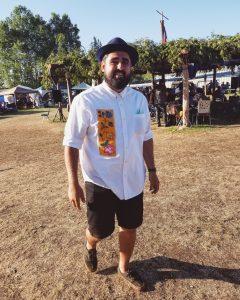 Shady Hafez: is Algonquin / Syrian from Kitigan Zibi Anishinabeg. Shady recently completed his MA in Indigenous Governance from the University of Victoria and also holds a BA in Canadian Studies and Law, concentration in Law, Government and Policy from Carleton University. Currently residing in Kitigan Zibi Anishinabeg, Shady coordinates a Mental Wellness Team and strives to ensure that Anishinabe values and philosophies are at the forefront of mental wellness initiatives in his community.
Shady Hafez: is Algonquin / Syrian from Kitigan Zibi Anishinabeg. Shady recently completed his MA in Indigenous Governance from the University of Victoria and also holds a BA in Canadian Studies and Law, concentration in Law, Government and Policy from Carleton University. Currently residing in Kitigan Zibi Anishinabeg, Shady coordinates a Mental Wellness Team and strives to ensure that Anishinabe values and philosophies are at the forefront of mental wellness initiatives in his community.
Shady is also an avid writer and commentator, who’s work can be found on his personal blog “Not Your Average Indian” as well as on BuzzFeed, the Ottawa Citizen, Ottawa Life Magazine, Anishinabek News and as a finalist in the Indigenous Arts & Stories competition. Shady’s commentary on important Indigenous issues has garnered the attention of the CBC, The Ottawa Citizen,The David Suzuki Foundation and The Muslim Link, who have all given Shady the opportunity to provide commentary on issues around Indigenous identity, decolonization, nationhood, culture, health and politics.
One of Shady’s aspirations is to create more spaces for conversations around Indigenous identities that are formed between the confluence of new immigrants from colonized countries and Indigenous peoples. In focusing our relationship building efforts with other colonized or marginalized communities of color, Shady feels a stronger movement towards decolonization can be built.
When he’s not working, Shady can be found volunteering at community events or frequenting the Powwow trail as a dancer with his family. As a seasoned traditional artist, dancer and singer, Shady finds deep enjoyment in practicing and advancing Anishinabe cultural expressions in an ever changing world.
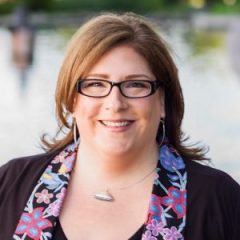 Linda Grussani: is a member of the Kitigan Zibi Anishinabeg First Nation, born and raised in Ottawa, Ontario. A curator and art historian, she presently holds the position of Curator, Aboriginal Art at the Canadian Museum of History. Previously, Linda was the Director of the Aboriginal Art Centre at Indigenous and Northern Affairs Canada (INAC) and has worked in the Indigenous and Canadian art departments at the National Gallery of Canada. She holds both a BA and MA in Art History from Carleton University and is currently working towards a PHD in Cultural Studies at Queen’s University. Linda is a graduate of INAC’s Aboriginal Leadership Development Initiative (2014-15) program and the Canadian Museum of History’s Aboriginal Training Programme in Museum Practices (2000-2001). Linda is a member of the Aboriginal Education Council for OCAD University and has served on the Board of Directors of the Aboriginal Curatorial Collective (2007-2011) and on the Board of Directors of Gallery 101, an Ottawa Artist-run centre.
Linda Grussani: is a member of the Kitigan Zibi Anishinabeg First Nation, born and raised in Ottawa, Ontario. A curator and art historian, she presently holds the position of Curator, Aboriginal Art at the Canadian Museum of History. Previously, Linda was the Director of the Aboriginal Art Centre at Indigenous and Northern Affairs Canada (INAC) and has worked in the Indigenous and Canadian art departments at the National Gallery of Canada. She holds both a BA and MA in Art History from Carleton University and is currently working towards a PHD in Cultural Studies at Queen’s University. Linda is a graduate of INAC’s Aboriginal Leadership Development Initiative (2014-15) program and the Canadian Museum of History’s Aboriginal Training Programme in Museum Practices (2000-2001). Linda is a member of the Aboriginal Education Council for OCAD University and has served on the Board of Directors of the Aboriginal Curatorial Collective (2007-2011) and on the Board of Directors of Gallery 101, an Ottawa Artist-run centre.
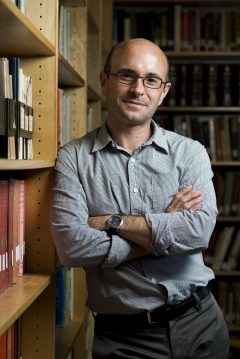 Michel Hogue: is associate professor in the Department of History at Carleton University, where he teaches courses in Indigenous, Canadian, and U.S. histories. He is the author of Metis and the Medicine Line: Creating a Border and Dividing a People (Chapel Hill: University of North Carolina Press; Regina: University of Regina Press, 2015). His current research, which forms part of a larger research project with colleagues at the University of Alberta and the Gabriel Dumont Institute, focuses on how historians and others have produced historical knowledge about twentieth-century Metis communities.
Michel Hogue: is associate professor in the Department of History at Carleton University, where he teaches courses in Indigenous, Canadian, and U.S. histories. He is the author of Metis and the Medicine Line: Creating a Border and Dividing a People (Chapel Hill: University of North Carolina Press; Regina: University of Regina Press, 2015). His current research, which forms part of a larger research project with colleagues at the University of Alberta and the Gabriel Dumont Institute, focuses on how historians and others have produced historical knowledge about twentieth-century Metis communities.
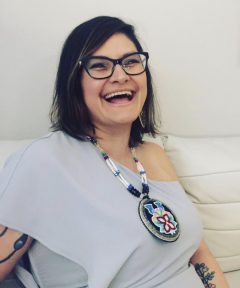 Geraldine King: is a member of Gull Bay First Nation located in the Robinson Superior Treaty area of Ontario. Currently, Ms. King is a PhD candidate in the Cultural Studies program at Queen’s University where she is a Joseph Armand Bombardier Canada Graduate scholar. For over 17 years, Geraldine has worked in the private, public and university sectors in a variety of roles including: program and policy development, facilitation, research, course development and analysis. Presently, Geraldine is an Adjunct Lecturer at Queens University, Carleton University and is an instructor and course developer at Algonquin College in Ottawa.
Geraldine King: is a member of Gull Bay First Nation located in the Robinson Superior Treaty area of Ontario. Currently, Ms. King is a PhD candidate in the Cultural Studies program at Queen’s University where she is a Joseph Armand Bombardier Canada Graduate scholar. For over 17 years, Geraldine has worked in the private, public and university sectors in a variety of roles including: program and policy development, facilitation, research, course development and analysis. Presently, Geraldine is an Adjunct Lecturer at Queens University, Carleton University and is an instructor and course developer at Algonquin College in Ottawa.
Ms. King is regularly called upon to provide keynote addresses in the areas of Indigenous research methodologies, Anishinaabe literature, decolonizing feminisms as well as presenting her creative writing at various festivals and art shows. Geraldine is also an active member of the Cultural Studies research ethics board where she reviews and provides insights into the ethical considerations of conducting research with Indigenous peoples.
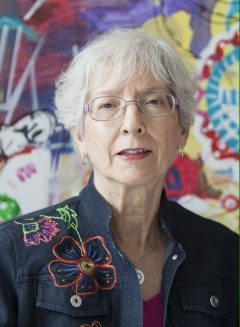 Marie-Louise Perron: B.A., B.Ed., M. ès Arts, Ottawa, Ontario. Marie-Louise Perron was born on her grandfather’s land in Saskatchewan. She is a descendant of Red River Métis and early French newcomers. Through several different careers, high school teacher, visual artist, author, archivist, and public servant, Ms Perron has maintained the storytelling tradition of her people. She has presented and published, in both English and French for national and international audiences, on subjects including the French/Métis songs and stories of the Perron-Laderoute-Marion-St. Arnaud families, instruction on tracing one’s family history, and the value of archives to society. Now retired, Ms Perron pursues historical and genealogical research projects, offers workshops on tracing Indigenous ancestry, studies traditional violin, and participates in many styles of storytelling old and new, including video and digital storytelling. She also maintains her artistic practice in watercolours, mixed media on canvas and photography and has participated in solo and group exhibitions in several regions in Canada. Her work can be found in a numb of private and institutional collections across the country.
Marie-Louise Perron: B.A., B.Ed., M. ès Arts, Ottawa, Ontario. Marie-Louise Perron was born on her grandfather’s land in Saskatchewan. She is a descendant of Red River Métis and early French newcomers. Through several different careers, high school teacher, visual artist, author, archivist, and public servant, Ms Perron has maintained the storytelling tradition of her people. She has presented and published, in both English and French for national and international audiences, on subjects including the French/Métis songs and stories of the Perron-Laderoute-Marion-St. Arnaud families, instruction on tracing one’s family history, and the value of archives to society. Now retired, Ms Perron pursues historical and genealogical research projects, offers workshops on tracing Indigenous ancestry, studies traditional violin, and participates in many styles of storytelling old and new, including video and digital storytelling. She also maintains her artistic practice in watercolours, mixed media on canvas and photography and has participated in solo and group exhibitions in several regions in Canada. Her work can be found in a numb of private and institutional collections across the country.
Ms Perron is active in the Ottawa Métis community as Councilor in the Ottawa Region Métis Council
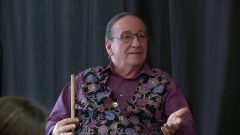 Gilbert W. Whiteduck: is (Anishinabe) Algonquin from the Kitigan Zibi Anishinabeg First Nation. He was elected Chief of the Kitigan Zibi Anishinabeg community and served from June 2008 to April 2015. He had previously been elected to the Kitigan Zibi Anishinabeg Band Council at different intervals, for a total period of 12 years over the past 4 decades. Mr. Whiteduck holds a B.S.W (Honours), a B.Ed, an M.Ed and an Honorary Doctorate which he received from the University of Ottawa in 1999. Mr. Whiteduck was involved in the field of First Nations education for over 33 years. He has held many positions during this period including that of guidance counsellor, teacher, school principal and director of education. He subsequently served for a period of close to 2 years as Senior Education Advisor with the First Nations Education Council which represents 22 First Nation communities in the Province of Quebec.
Gilbert W. Whiteduck: is (Anishinabe) Algonquin from the Kitigan Zibi Anishinabeg First Nation. He was elected Chief of the Kitigan Zibi Anishinabeg community and served from June 2008 to April 2015. He had previously been elected to the Kitigan Zibi Anishinabeg Band Council at different intervals, for a total period of 12 years over the past 4 decades. Mr. Whiteduck holds a B.S.W (Honours), a B.Ed, an M.Ed and an Honorary Doctorate which he received from the University of Ottawa in 1999. Mr. Whiteduck was involved in the field of First Nations education for over 33 years. He has held many positions during this period including that of guidance counsellor, teacher, school principal and director of education. He subsequently served for a period of close to 2 years as Senior Education Advisor with the First Nations Education Council which represents 22 First Nation communities in the Province of Quebec.
Mr. Whiteduck has also served on numerous local, regional and national boards, committees and working groups. He served for a period of 7 years as President of the First Nation Confederacy of Cultural Education Centers which represents some 50 First Nation Cultural Education Centres in Canada. He was named in October 2015 by the Quebec Minister of Health and Social Services to serve for a 3 year mandate on the CISSS-O which is an integrated regional board that is responsible to oversee and direct all the hospitals, old age homes and social services in the Outaouais area. He is presently working as a Treatment Coordinator and Residential Counsellor at the Wanaki Wellness Center located in the Kitigan Zibi Anishinabeg community. Mr. Whiteduck remains active in his efforts to ensure that First Nation voices are not only heard but understood. He continues to seek balance through ceremony and connection to elders. He walks with an understanding of the historical past that guides him in respecting the present moments with humbleness and love.
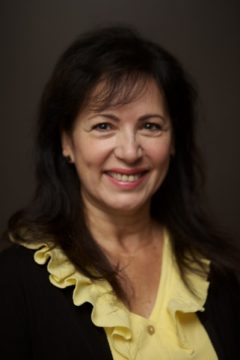 Deborah Pelletier: Ms. Pelletier’s background includes a lifelong career as an educator, librarian and consultant on information management and recordkeeping in libraries, archival, cultural centers and educational institutions. She has engaged Aboriginal communities to define and communicate their interests and needs and to work collaboratively towards the incorporation of Aboriginal content and perspectives in policy, programs and services and for universal and equitable access to Aboriginal documentary heritage.
Deborah Pelletier: Ms. Pelletier’s background includes a lifelong career as an educator, librarian and consultant on information management and recordkeeping in libraries, archival, cultural centers and educational institutions. She has engaged Aboriginal communities to define and communicate their interests and needs and to work collaboratively towards the incorporation of Aboriginal content and perspectives in policy, programs and services and for universal and equitable access to Aboriginal documentary heritage.
Deborah has participated at national and international forums and has co-authored a number of informational and educational resources incorporating Aboriginal content and perspective. After many years working for provincial and federal governments, Deborah is now working as a consultant on Aboriginal education, libraries, archives and information management.
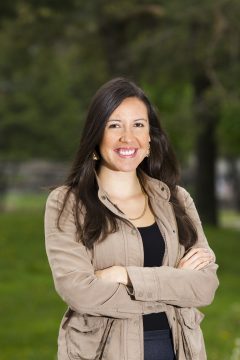 Mallory Whiteduck: is Anishinabekwe from Kitigan Zibi Anishinabeg. She is currently a PhD student in the Department of American Culture at the University of Michigan, where her research focuses on Indigenous literatures, women’s life writing and collective storytelling. Her previous experience includes teaching at the University of Michigan and Algonquin College, and research on missing and murdered Indigenous women and girls at the Native Women’s Association of Canada. Mallory is also a former staff member of Carleton’s Centre for Indigenous Initiatives and was a member of the team that originally developed CUIERIP.
Mallory Whiteduck: is Anishinabekwe from Kitigan Zibi Anishinabeg. She is currently a PhD student in the Department of American Culture at the University of Michigan, where her research focuses on Indigenous literatures, women’s life writing and collective storytelling. Her previous experience includes teaching at the University of Michigan and Algonquin College, and research on missing and murdered Indigenous women and girls at the Native Women’s Association of Canada. Mallory is also a former staff member of Carleton’s Centre for Indigenous Initiatives and was a member of the team that originally developed CUIERIP.
 Brittany Amell: is a PhD student studying in Applied Linguistics and Discourse Studies at Carleton University. Although her research focuses on how doctoral writers interpret and take up calls for decolonization, Indigenization, and reconciliation in their scholarship, ultimately she questions whether it is possible to decolonize institutions of colonial power—and what can be done instead. During the warmer months, you can find Britt “shiny side up” on her trusty motorcycle out exploring some part of the 36,000 square kilometres of Algonquin land that makes up her temporary home.
Brittany Amell: is a PhD student studying in Applied Linguistics and Discourse Studies at Carleton University. Although her research focuses on how doctoral writers interpret and take up calls for decolonization, Indigenization, and reconciliation in their scholarship, ultimately she questions whether it is possible to decolonize institutions of colonial power—and what can be done instead. During the warmer months, you can find Britt “shiny side up” on her trusty motorcycle out exploring some part of the 36,000 square kilometres of Algonquin land that makes up her temporary home.
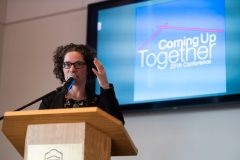 Jacqueline Kennelly: Her most recent book is entitled Olympic Exclusions: Youth, Poverty, and Social Legacies (Routledge 2016). It summarizes a six year research project investigating the experiences of low-income youth in the Olympic host cities of Vancouver (host to the 2010 Winter Olympics) and London (host to the 2012 Summer Olympics), using qualitative and visual methods. She is also the author of Citizen Youth: Culture, Activism, and Agency in a Neoliberal Era (Palgrave MacMillan, 2011), and the co-author (with J. Dillabough) of Lost Youth in the Global City: Class, Culture, and the Urban Imaginary (Routledge, 2010). She co-edited (with S. Poyntz) Phenomenology of Youth Cultures and Globalization: Lifeworlds and Surplus Meanings in Changing Times (Routledge 2015). Dr. Kennelly’s current research focuses on homeless young people’s experiences of citizenship and belonging, as well as what is needed to effectively support them out of homelessness. Her work has appeared in a number of national and international peer-reviewed journals, including British Journal of Sociology of Education, British Journal of Criminology, Sociology, Review of Education, Pedagogy, and Cultural Studies, Citizenship Studies, Visual Studies, Journal of Youth Studies, Ethnography, Feminist Theory, Young, Sociological Research Online, and Gender and Education.
Jacqueline Kennelly: Her most recent book is entitled Olympic Exclusions: Youth, Poverty, and Social Legacies (Routledge 2016). It summarizes a six year research project investigating the experiences of low-income youth in the Olympic host cities of Vancouver (host to the 2010 Winter Olympics) and London (host to the 2012 Summer Olympics), using qualitative and visual methods. She is also the author of Citizen Youth: Culture, Activism, and Agency in a Neoliberal Era (Palgrave MacMillan, 2011), and the co-author (with J. Dillabough) of Lost Youth in the Global City: Class, Culture, and the Urban Imaginary (Routledge, 2010). She co-edited (with S. Poyntz) Phenomenology of Youth Cultures and Globalization: Lifeworlds and Surplus Meanings in Changing Times (Routledge 2015). Dr. Kennelly’s current research focuses on homeless young people’s experiences of citizenship and belonging, as well as what is needed to effectively support them out of homelessness. Her work has appeared in a number of national and international peer-reviewed journals, including British Journal of Sociology of Education, British Journal of Criminology, Sociology, Review of Education, Pedagogy, and Cultural Studies, Citizenship Studies, Visual Studies, Journal of Youth Studies, Ethnography, Feminist Theory, Young, Sociological Research Online, and Gender and Education.
 Brenda Macdougall: In 2010 she was hired as the Chair of Métis Research at the University of Ottawa where she is also an associate professor in the department of geography. Prior to this, she worked for over ten years in the Department of Native Studies at the University of Saskatchewan, the program from which she received her PhD. Her career has been spent studying Metis history and culture from the inside—seeking ways to express Metis history from the perspective of a Metis worldview and set of understandings. As such, she works to understand traditional kinship practices as the foundation of all social and political behaviors within Metis communities. It’s common to hear people say that the history of Indigenous people can’t authentically be located in colonial historical records but our stories and perspectives are imprinted all throughout those repositories—we simply have to pay attention to the tracks in the documents that our ancestors left for us. Based on that research she has written several articles and her first book, One of the Family: Metis Culture in Nineteenth-Century Northwestern Saskatchewan (UBCPress, 2010) was awarded the Cleo Prize for best book in the prairie division by the Canadian Historical Association in 2011. Through her scholarship, Brenda has worked extensively with Metis communities in Ontario, Manitoba, North Dakota, Saskatchewan, Montana and Alberta researching their histories and documenting the connections and relationships between family members as a lens to understanding both Metis society and culture. In her role as research chair, Brenda has built a strong program of research in the connections between Metis families across the Metis homeland. More recently, she and her colleagues created the Digital Archives Database Project, an online archive of transcribed historical records, with the support of the Métis and Non-Status Indian Relations Directorate and has served as an advisor on the General History Committee overseeing the redesign of Canada History Hall at the Canadian Museum of History.
Brenda Macdougall: In 2010 she was hired as the Chair of Métis Research at the University of Ottawa where she is also an associate professor in the department of geography. Prior to this, she worked for over ten years in the Department of Native Studies at the University of Saskatchewan, the program from which she received her PhD. Her career has been spent studying Metis history and culture from the inside—seeking ways to express Metis history from the perspective of a Metis worldview and set of understandings. As such, she works to understand traditional kinship practices as the foundation of all social and political behaviors within Metis communities. It’s common to hear people say that the history of Indigenous people can’t authentically be located in colonial historical records but our stories and perspectives are imprinted all throughout those repositories—we simply have to pay attention to the tracks in the documents that our ancestors left for us. Based on that research she has written several articles and her first book, One of the Family: Metis Culture in Nineteenth-Century Northwestern Saskatchewan (UBCPress, 2010) was awarded the Cleo Prize for best book in the prairie division by the Canadian Historical Association in 2011. Through her scholarship, Brenda has worked extensively with Metis communities in Ontario, Manitoba, North Dakota, Saskatchewan, Montana and Alberta researching their histories and documenting the connections and relationships between family members as a lens to understanding both Metis society and culture. In her role as research chair, Brenda has built a strong program of research in the connections between Metis families across the Metis homeland. More recently, she and her colleagues created the Digital Archives Database Project, an online archive of transcribed historical records, with the support of the Métis and Non-Status Indian Relations Directorate and has served as an advisor on the General History Committee overseeing the redesign of Canada History Hall at the Canadian Museum of History.
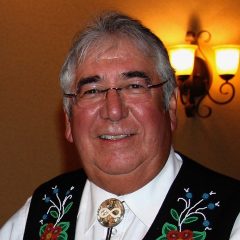 Tony Belcourt: Born in the historic Métis community of Lac Ste. Anne, Alberta, his career spans 45 years of experience and significant achievement in Aboriginal affairs, the corporate, government and not-for-profit sectors. During this period he founded, led and served on the boards of numerous local, regional, national and international Aboriginal organizations including the Native Council of Canada (1970-74), the Métis Nation of Ontario (1993-2008), the Métis National Council (1994 -2008) and the Indigenous Commission for Communications Technologies in the Americas (2005-Present). Mr. Belcourt, as Métis Nation Ambassador for International Issues, participated in numerous international meetings of the United Nations and the Organization of American States, including negotiations on the UN Declaration on the Rights of Indigenous Peoples.
Tony Belcourt: Born in the historic Métis community of Lac Ste. Anne, Alberta, his career spans 45 years of experience and significant achievement in Aboriginal affairs, the corporate, government and not-for-profit sectors. During this period he founded, led and served on the boards of numerous local, regional, national and international Aboriginal organizations including the Native Council of Canada (1970-74), the Métis Nation of Ontario (1993-2008), the Métis National Council (1994 -2008) and the Indigenous Commission for Communications Technologies in the Americas (2005-Present). Mr. Belcourt, as Métis Nation Ambassador for International Issues, participated in numerous international meetings of the United Nations and the Organization of American States, including negotiations on the UN Declaration on the Rights of Indigenous Peoples.
His efforts were an important contributing factor in the Métis being recognized in the Constitution Act, 1982, as one of the Aboriginal Peoples of Canada and were instrumental in bringing about constitutional recognition of existing Métis rights at the Supreme Court of Canada in the case of R. v. Powley in 2003.
Mr. Belcourt served on many boards and advisory committees including the Board of Governors of the Ontario College of Art and Design University (OCADU), the Institute on Governance and Canadians for a New Partnership. In 2004 he was gifted a Thunder Pipe. In 2006, he received a National Aboriginal Achievement Award for public service. Mr. Belcourt received an Honorary Doctor of Laws Degree from Lakehead University in 2010. In 2013 Mr. Belcourt was appointed an Officer of the Order of Canada.
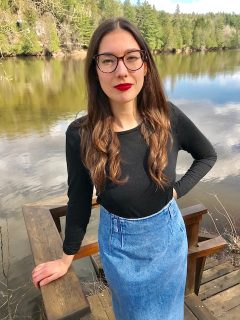 Lindsay Lachance: is the Artistic Associate of Indigenous Theatre at The National Arts Centre. She is of Algonquin Anishinabe and settler Canadian ancestry. Lindsay has a PhD in Theatre from the University of British Columbia and received her Masters in Theatre Theory and Dramaturgy from the University of Ottawa. She has taught sessional courses in First Nations & Indigenous Studies at the University of British Columbia and Indigenous Theatre at Simon Fraser University. Her areas of interest include performance as politics, the physicalization of spirituality in time and space, and the multiple creation processes of Indigenous dramaturgies. Lindsay is an active theatre professional, reviewer and scholar and has presented her research at seven international conferences. She has participated at events hosted by The National Arts Centre, The PuSh Festival, Indigenous Performing Arts Alliance, the Museum of Anthropology, and the Audain Gallery at SFU. Lachance is a member of Full Circle First Nations Performance and the Indigenous Performing Arts Alliance.
Lindsay Lachance: is the Artistic Associate of Indigenous Theatre at The National Arts Centre. She is of Algonquin Anishinabe and settler Canadian ancestry. Lindsay has a PhD in Theatre from the University of British Columbia and received her Masters in Theatre Theory and Dramaturgy from the University of Ottawa. She has taught sessional courses in First Nations & Indigenous Studies at the University of British Columbia and Indigenous Theatre at Simon Fraser University. Her areas of interest include performance as politics, the physicalization of spirituality in time and space, and the multiple creation processes of Indigenous dramaturgies. Lindsay is an active theatre professional, reviewer and scholar and has presented her research at seven international conferences. She has participated at events hosted by The National Arts Centre, The PuSh Festival, Indigenous Performing Arts Alliance, the Museum of Anthropology, and the Audain Gallery at SFU. Lachance is a member of Full Circle First Nations Performance and the Indigenous Performing Arts Alliance.
 Steven Loft: is a Mohawk of the Six Nations with Jewish heritage. He is currently the Director of the Creating Knowing and Sharing: The Arts and Cultures of First Nations, Inuit and Métis Peoples program with the Canada Council for the Arts. A curator, scholar, writer and media artist, in 2010 he was named Trudeau National Visiting Fellow at Ryerson University in Toronto. Loft has also held positions as Curator-In-Residence, Indigenous Art at the National Gallery of Canada, Director/Curator of the Urban Shaman Gallery (Winnipeg); Aboriginal Curator at the Art Gallery of Hamilton and Producer and Artistic Director of the Native Indian/Inuit Photographers’ Association (Hamilton). He has curated group and solo exhibitions across Canada and internationally; written extensively for magazines, catalogues and arts publications and lectured widely in Canada and internationally. Loft co-edited the books Transference, Technology, Tradition: Aboriginal Media and New Media Art (Banff Centre Press, 2005) and Coded Territories: Indigenous Pathways in New Media (University of Calgary Press, 2014).
Steven Loft: is a Mohawk of the Six Nations with Jewish heritage. He is currently the Director of the Creating Knowing and Sharing: The Arts and Cultures of First Nations, Inuit and Métis Peoples program with the Canada Council for the Arts. A curator, scholar, writer and media artist, in 2010 he was named Trudeau National Visiting Fellow at Ryerson University in Toronto. Loft has also held positions as Curator-In-Residence, Indigenous Art at the National Gallery of Canada, Director/Curator of the Urban Shaman Gallery (Winnipeg); Aboriginal Curator at the Art Gallery of Hamilton and Producer and Artistic Director of the Native Indian/Inuit Photographers’ Association (Hamilton). He has curated group and solo exhibitions across Canada and internationally; written extensively for magazines, catalogues and arts publications and lectured widely in Canada and internationally. Loft co-edited the books Transference, Technology, Tradition: Aboriginal Media and New Media Art (Banff Centre Press, 2005) and Coded Territories: Indigenous Pathways in New Media (University of Calgary Press, 2014).
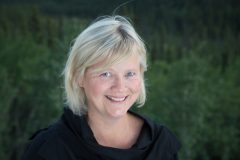 Kanina Holmes: is an associate professor at the School of Journalism and Communication at Carleton University. She works with both undergraduate and graduate students, teaching everything from the first-year introduction to journalism to reporting ethics, video documentary, international reporting and multimedia journalism. Before coming to Carleton in 2004, Kanina worked and lived in Europe and Africa. Her journalism career took her to Ontario, Manitoba and Yukon with CBC, Global TV, CTV and Reuters. In the summer of 2017, Kanina launched Stories North, an experiential education initiative that brought journalism students to the Yukon for a month of deep learning about Indigenous history, culture and the legacies of residential schools. You can see the students’ work at: www.storiesnorth.com.
Kanina Holmes: is an associate professor at the School of Journalism and Communication at Carleton University. She works with both undergraduate and graduate students, teaching everything from the first-year introduction to journalism to reporting ethics, video documentary, international reporting and multimedia journalism. Before coming to Carleton in 2004, Kanina worked and lived in Europe and Africa. Her journalism career took her to Ontario, Manitoba and Yukon with CBC, Global TV, CTV and Reuters. In the summer of 2017, Kanina launched Stories North, an experiential education initiative that brought journalism students to the Yukon for a month of deep learning about Indigenous history, culture and the legacies of residential schools. You can see the students’ work at: www.storiesnorth.com.
Stories North was created as a direct response to the Calls to Action in Canada’s Truth and Reconciliation Commission that were directed at journalists and educators. Kanina is returning to the Yukon this summer with 20 students, working to build Stories North into a permanent, expanding collaboration. She’s anxious to share the lessons learned so far and engage in brainstorming with the participants of CUIERIP. You can also connect with her at kanina.holmes@carleton.ca
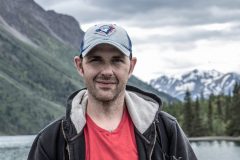 Dave Elliott: has worked at Carleton since 2005. In his job as a media producer he provides technical support and video production training for the School of Journalism and Communication. Dave enjoys working with students on their skills and helping them develop ideas. Dave graduated from Algonquin’s Television Broadcasting program in 2000. He worked an editor from 2000 to 2005 and also as a director, camera operator, audio and video producer for live events with a small production house in the National Capital Region. He has also worked on several television shows, TV commercials, music videos, training and promotional video for corporate and government video. He loves creating images through photography and video, documentaries, the great outdoors and travelling. Dave volunteered with Stories North in the summer of 2017 and is returning with the course this summer.
Dave Elliott: has worked at Carleton since 2005. In his job as a media producer he provides technical support and video production training for the School of Journalism and Communication. Dave enjoys working with students on their skills and helping them develop ideas. Dave graduated from Algonquin’s Television Broadcasting program in 2000. He worked an editor from 2000 to 2005 and also as a director, camera operator, audio and video producer for live events with a small production house in the National Capital Region. He has also worked on several television shows, TV commercials, music videos, training and promotional video for corporate and government video. He loves creating images through photography and video, documentaries, the great outdoors and travelling. Dave volunteered with Stories North in the summer of 2017 and is returning with the course this summer.
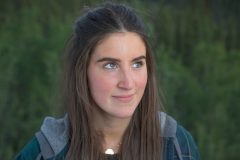 Kait Labbate: graduated from the journalism program at Carleton in 2016. She’s now the owner of Quay Creative Co., a content creation company focused on helping brands share compelling stories through unique forms of photography, videography and writing. Her work takes her traveling to new places immersing herself in local culture to find unique stories that bring out the connections we all share. Kait worked with Stories North in 2017 and will return again in 2018, mentoring students, helping them find their individual styles as videographers and develop their skills in visual storytelling. Contact her at kaitlabbate@gmail.com.
Kait Labbate: graduated from the journalism program at Carleton in 2016. She’s now the owner of Quay Creative Co., a content creation company focused on helping brands share compelling stories through unique forms of photography, videography and writing. Her work takes her traveling to new places immersing herself in local culture to find unique stories that bring out the connections we all share. Kait worked with Stories North in 2017 and will return again in 2018, mentoring students, helping them find their individual styles as videographers and develop their skills in visual storytelling. Contact her at kaitlabbate@gmail.com.
 Amy Burlock: is about to graduate from the linguistics program at Carleton. Thanks to her enthusiasm and persistence, she joined Stories North in the summer of 2017 as the only student from outside journalism. During the course she focused on a project that looked at the cultural roots of language among some of the Yukon’s First Nations communities and the work being done to preserve these unique languages.
Amy Burlock: is about to graduate from the linguistics program at Carleton. Thanks to her enthusiasm and persistence, she joined Stories North in the summer of 2017 as the only student from outside journalism. During the course she focused on a project that looked at the cultural roots of language among some of the Yukon’s First Nations communities and the work being done to preserve these unique languages.
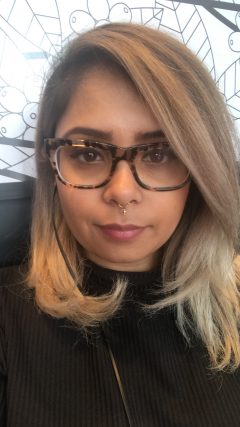 Anna Shah Hoque: is a PhD student in the Joint Doctoral Program at the School of Indigenous and Canadian Studies at Carleton University and the Frost Centre for Canadian Studies and Indigenous Studies at Trent University in Canada. She has received her Master of Arts in Communication & Media Studies and a BA Combined Honours in Canadian Studies and Communication Studies with a Minor in Sexuality Studies. Her Master’s thesis interrogated the nature of nationalistic media texts and more specifically what alter-narratives emerge when turning to Indigenous media makers who directly and indirectly utilize the Minutes to critically engage with settler discourses of Canadian nationalism. Her research focuses on storytelling, critical race theory, decolonization, visual culture, and its relationship with activism. She is particularly looking to the elasticity of the notion of ‘refusal’ in bridging and expanding on the discussions between political and visual sovereignties. Ms. Shah Hoque is a member of the Leadership team for the creation of the week-long Carleton University Institute on the Ethics of Research with Indigenous Peoples. She also serves as a member on the CUIERIP Curriculum Development Sub-Committee.
Anna Shah Hoque: is a PhD student in the Joint Doctoral Program at the School of Indigenous and Canadian Studies at Carleton University and the Frost Centre for Canadian Studies and Indigenous Studies at Trent University in Canada. She has received her Master of Arts in Communication & Media Studies and a BA Combined Honours in Canadian Studies and Communication Studies with a Minor in Sexuality Studies. Her Master’s thesis interrogated the nature of nationalistic media texts and more specifically what alter-narratives emerge when turning to Indigenous media makers who directly and indirectly utilize the Minutes to critically engage with settler discourses of Canadian nationalism. Her research focuses on storytelling, critical race theory, decolonization, visual culture, and its relationship with activism. She is particularly looking to the elasticity of the notion of ‘refusal’ in bridging and expanding on the discussions between political and visual sovereignties. Ms. Shah Hoque is a member of the Leadership team for the creation of the week-long Carleton University Institute on the Ethics of Research with Indigenous Peoples. She also serves as a member on the CUIERIP Curriculum Development Sub-Committee.
John Medicine Horse Ke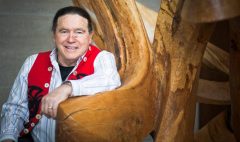 lly: Professor of Journalism, Co-Director of the Centre for Indigenous Research, Culture, Language and Education (Carleton University) and the co-host of the Panel on Research Ethics’ webinar “Research Involving First Nations, Inuit and Metis Peoples of Canada (May 10, 2012)”. Dr. Kelly is also a contributor to the soon-to-be-released Panel on Research Ethics’ tutorial for Chapter 9. He is a member of the curriculum development sub-committee for the Carleton University Institute on the Ethics of Research with Indigenous Peoples and is a member of the leadership team for the creation of the Carleton University Institute on the Ethics of Research with Indigenous Peoples.
lly: Professor of Journalism, Co-Director of the Centre for Indigenous Research, Culture, Language and Education (Carleton University) and the co-host of the Panel on Research Ethics’ webinar “Research Involving First Nations, Inuit and Metis Peoples of Canada (May 10, 2012)”. Dr. Kelly is also a contributor to the soon-to-be-released Panel on Research Ethics’ tutorial for Chapter 9. He is a member of the curriculum development sub-committee for the Carleton University Institute on the Ethics of Research with Indigenous Peoples and is a member of the leadership team for the creation of the Carleton University Institute on the Ethics of Research with Indigenous Peoples.
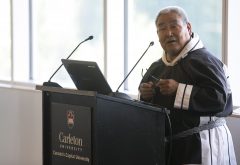 David Serkoak: David Serkoak was born into a traditional Inuit camp on the northern shore of Neultin Lake, south west of Arviat, Nunavut in 1952. He lived through the many hardships suffered by his people, the Ahiarmiut, as they were moved from place to place by the Federal Government. Serkoak attended Territorial School in Rankin Inlet and Whale Cove in the 1960s. He moved with his family to Arviat and for a while he worked at promoting art made by local Inuit artists. Serkoak got interested in education when working part-time in the local school. He attended Thebatcha College in Fort Smith, NWT (1976-78) where he successfully completed a diploma in education. In the summer of 1978, Serkoak returned to Arviat to teach, where he promoted Inuit culture, language and music in his classroom and throughout the school. Serkoak was appointed vice-principal in 1986 and he completed his B.Ed. in elementary education at Nunavut Arctic College/McGill University in 1993. Serkoak has had a long and varied experience in education, teaching at the primary, and secondary and college levels. He was an instructor at Nunavut Arctic College, teaching course in the B.Ed. program and Curator of the Arctic Exhibition at the British Museum in 1989. Serkoak spent six years as Inuit Language and Cultural instructor at Nunavut Sivuniksavut, a college preparation program for young Inuit which is based in Ottawa. Serkoak developed Inuktitut teaching materials for every level at which he taught.
David Serkoak: David Serkoak was born into a traditional Inuit camp on the northern shore of Neultin Lake, south west of Arviat, Nunavut in 1952. He lived through the many hardships suffered by his people, the Ahiarmiut, as they were moved from place to place by the Federal Government. Serkoak attended Territorial School in Rankin Inlet and Whale Cove in the 1960s. He moved with his family to Arviat and for a while he worked at promoting art made by local Inuit artists. Serkoak got interested in education when working part-time in the local school. He attended Thebatcha College in Fort Smith, NWT (1976-78) where he successfully completed a diploma in education. In the summer of 1978, Serkoak returned to Arviat to teach, where he promoted Inuit culture, language and music in his classroom and throughout the school. Serkoak was appointed vice-principal in 1986 and he completed his B.Ed. in elementary education at Nunavut Arctic College/McGill University in 1993. Serkoak has had a long and varied experience in education, teaching at the primary, and secondary and college levels. He was an instructor at Nunavut Arctic College, teaching course in the B.Ed. program and Curator of the Arctic Exhibition at the British Museum in 1989. Serkoak spent six years as Inuit Language and Cultural instructor at Nunavut Sivuniksavut, a college preparation program for young Inuit which is based in Ottawa. Serkoak developed Inuktitut teaching materials for every level at which he taught.
Serkoak is much in demand at regional, national and international conferences and events where he gives demonstrations in traditional drum dancing. He was a member of the Winter Olympic Symposium Committee in Vancouver, advising and coordinating on indigenous performances. He took part in the opening and closing ceremonies at the Aboriginal pavilion and at the games. He regularly gives drum making and drum dancing classes throughout Nunavut and other parts of Canada. Serkoak is one of the four Inuit informants in Uqalurait: An Oral History of Nunavut, edited by John Bennett and Susan Rowley and published by McGill Queen’s Press in 2004. This seminal work draws on the oral history of Inuit to provide insight into the culture and values of one of Canada’s first peoples. Today, Serkoak spends much of his time making traditional Inuit drums and teaching Inuit youth about their culture and history. He and his wife Leslie have three daughters, Amanda, Meeka and Karla and six grandchildren, Briana, Makayla, Kyle, Laura, Ryan and Emma. When not travelling, Serkoak spends as many hours as he can with his beloved grandchildren.